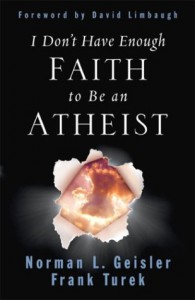Critiquing "I Don't Have Enough Faith to Be an Atheist" (p.17-19)
The 12-point argument for the Bible's divinely-inspired authority doesn't actually start until Chapter 1, but Mssrs. Geisler and Turek make a couple of assertions in their book's introduction ("Finding the Box Top to the Puzzle of Life") that require addressing - and more importantly, also begin to reveal a tendency they have to manipulate their readers.
Their introduction begins by recounting Frank Turek's experience as an undergraduate in a university's course on the Old Testament. Turek writes:
From the beginning, the professor took a very skeptical view of the Old Testament. He immediately affirmed the theory that Moses did not write the first five books of the Bible, and that many of the Bible's supposed prophetic passages were written after the fact.
At the end of the semester, Turek claims he was nearly convinced the Bible could not be taken as read, but still didn't know whether that meant God existed. So he decided to ask his professor.
Without a moment's hesitation he snapped, "I don't know."
"You don't know?"
"No, I have no idea."
Hearing this, Turek "simply walked out, frustrated with the entire semester... I expected a lot more from a university religion professor. I later learned that my expectations were too high for the modern university" (18-19).
Like most Christian conservatives, Turek and Geisler have a serious axe to grind with today's public universities. They deride the attitude they believe has taken hold in the "_plura_versities" that "deem every viewpoint, no matter how ridiculous, just as valid as any other" (19).
This accusation of theirs is, I think, an oversimplification of what's actually a pretty reasonable point-of-view. Sure, there are plenty of people out there who just so hate conflict that they've chosen to protect themselves from it by effectively shutting off their minds to the question of who's right and who's wrong in politics and religion. There are also those who've put serious thought into the matter, however, and have decided against judging world views because if The Truth is unknowable - and there are good reasons to suggest it's not - then practically speaking, all that matters is what works for you, while not infringing on others' search for what works for them. I'm not really a fan of this view, but it makes more sense than Geisler and Turek are suggesting here when they condescendingly explain how two mutually contradictory claims can't both be true (do they truly believe this idea's never occurred to the "_plura_versities" with whom they disagree?).
But we'll talk more about agnosticism when Geisler and Turek do; I don't want to get ahead of them. Today I just want to talk about Turek's Old Testament professor, because the episode irks me. The avowed agnosticism of Turek's professor doesn't bother me as it did (and apparently still does) bother Turek because it's clearly only a summary of the man's ideas on the subject. As a lone statement it doesn't tell us much at all; the specifics of his world view clearly require a little unpacking. All of which is to say that if Turek had simply stuck around long enough to ask a second or even third question, he probably would have gotten a much more concrete response.
Obviously I can't know what Turek's O.T. professor would have said if given the chance, but here's just one of many possibilities:
"If you don't know if God exists, how do you know the Bible isn't 100% true?"
"Oh no, I'm as certain as I can be that the Bible's version of God is incorrect. It bears all the marks of simply being a man-made document. But in so far as whether a being we could rightly name 'God' exists in our vast multiverse? Whether the Prime Mover was or is intelligent? I really have no clue and I'm not convinced we can. I wish it were otherwise."
See? That wasn't so hard, was it?
Here's the thing, though: taking this episode in isolation, I would simply chalk up Frank Turek's huffy exit here to a young man's impatience. But a pattern begins to emerge when you read through the other chapters of I Don't Have Enough Faith to Be an Atheist. It turns out Geisler & Turek love to provide us with anecdotes in which they wittily outmaneuver an atheist in a debate. Chapter 2 includes a plethora of them, including several more examples of how much smarter Christian apologists were as young men than their secular college professors (come to think it, it's practically a genre of anecdote in Christian apologetics: David and Goliath recast in an academic setting). And the cut-off points for a number of these recounted conversations are problematic for me in the same way Turek's opening story of his semester in an Old Testament class does, particularly when G&T; get to their patented "Road Runner Tactic" for debates in Chapter 2. I'll note them as we come upon them.
For now, I'm just going to point out that Frank Turek's lack of further inquiry into his old professor's belief accomplishes something: it makes the professor look more foolish than he probably was. As we continue reading through I Don't Have Enough Faith to Be an Atheist, I think we'll find Geisler and Turek do this often.
(A twice-weekly schedule, by the way, is looking about right for now. So see you on Sunday.)
